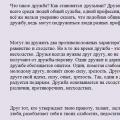It is customary to call Jewish names those that originate in Jewish sources and languages - Hebrew, Yiddish and others. Most of the names are based on different interpretations of the Bible. However, from those times when the Talmud and the Bible did not yet play the important role that they have acquired today, borrowing names from Jews was common. This is how names appeared, formed from the words of the Hebrew language - Menucha, Nechama, Meir. From the Babylonians came the name Mordechai, from the Chaldeans - Atlai and Bebai.
During Greek rule, Greek names became common. The name Alexander, which later became Sender, became most popular at that time. The tradition of borrowing names has continued to this day. Jews living in various countries, often as a second name they take names that are characteristic of a given area and are consonant with the main name. For example, Georgian Jews can take the following names: Isaac - Heraclius, Geshron - Guram. Central Asian Jews use Tajik names or Hebrew ones with the addition of a Tajik word-formation component. This is how names are formed that you will not find anywhere else - Rubensivi, Bovojon, Estermo.
In the Jewish tradition, it is customary to give a man ruf nomen at birth - the name with which he is called in the synagogue and remembered in prayers. Usually ruf nomen is a name from the Hebrew Bible or Talmud. It is used most often in religious ceremonies, and in other cases Jews are called by the name of their mother. This is why among Jews there are so many surnames derived from women's names.
Children are often named after older relatives. This is done in accordance with the idea of the Book of Life, into which all people fit. This tradition leads to the fact that a small number of names in a family are passed on from generation to generation. In different directions of Judaism there may be different ideas about which relatives - living or deceased - a child can be named after. But in any case, Jews believe that a child named after a famous representative of his family will inherit his qualities, and the baby will be under his protection.
In addition to the main name - ruf nomen - it is customary for Jews to give the child a second, secular name. Previously, it was given according to consonance, according to meaning, or based on the blessing of Jacob. However, today the simple whim of parents is becoming increasingly important. Most second names are borrowed from other languages. For example, Chaim-Vital means "life" in Hebrew and Latin. The name Chaim has a separate history. Once upon a time this name was given to the sick for magical purposes in order to deceive the Angel of Death.
Women's names were most actively borrowed. This is explained by the fact that there are not many female names in the Bible; in addition, women did not take part in religious ceremonies, and therefore double names were not necessary for them, although they did occur. This is how female names appeared in Yiddish, taken from other languages, Liebe - “beloved”, Golde - “gold”, Husni - “beautiful”. Slavic female names were also common among Jews - Zlata, Dobra, Charna.
The second name was used as an everyday name and was taken, as already noted, from the language of the surrounding people. Often such names were translated into Hebrew, or, conversely, adapted to the local language. It turned out that the same name in different countries sounded different. For example, the English name Grace in Germany became Kressl, and Katharina became Traine for Jews living in Austria, and Treintje for those living in Holland.
The emergence of foreign names is due to bilingualism. So Jews living in Greece could replace their name with an “equivalent” Greek one. For example, Tobi, meaning "best", became Ariston, and Matitya, "God's gift", became Theodore. In Muslim countries, traditionally Muslim names were used as second names - Abdallah, Hassan, Temin and others.
Some names have a close semantic connection. These are the names and nicknames that Patriarch Jacob gave to his children, blessing them. The most common example is the names Leib and Yehudah, which derive their connection from Jacob's words "The Young Lion Yehudah." Such names can replace each other in different situations. Often names that have the same translation from Yiddish and Hebrew acquire the same interchangeability, for example, Zeev-Wolf (both “wolf”), Dov and Ber (meaning “bear”).
There is also a small group of names derived from traditional Jewish holidays, for example, Passover.
Over time, new names appeared. They were either translated from Yiddish and Ladino, or simply invented. The latter include Ilan, meaning “tree,” and Oz, meaning “strength.” Also, children began to be given pagan Semitic names or unusual biblical ones, not used by religious Jews.
Some names were formed due to superstitions. For example, the name Alter or Olter literally means "old man." Once upon a time, this was the name given to any baby during his first month of life to protect him from danger from evil spirits. Gradually, this allegory turned into a common name, but it is always accompanied by a second one.
List of Jewish names
If the Orthodox used to look at the Saints to choose a name for a newborn, then the Jews always chose in three ways:
- Focusing on older relatives.
- In honor of your favorite biblical heroes.
- Dwelling on the Hebrew righteous.
Kabbalah teaches that the letters in the name are a connection with spiritual forces, therefore in practice there are cases when seriously ill people are called by double names, adding Chaim (life). In the books of Sholom Aleichem and Isaac Babel, such options appear quite often. Sometimes they are used and next to it is translation. For example, Zeev - Wolf.
The list of names will include only Hebrew (or Yiddish), although since 1917 any names have been allowed in Russia. Everywhere Barukhs and Berlys turned into Borisovs, and Leibs into Lvovs. In other countries (Palestine), the opposite processes took place, which was strictly monitored by the state. Boys are named at the time of circumcision - on the eighth day from birth. Let's look at the most common Jewish male names.
List in alphabetical order (from A to M) with translation
- Aaron -"mountain", brother of Moses, high priest.
- Abraham - considered a forefather (“father of nations”). The allowed option is Abram.
- Adam -"earth", in honor of the first man on Earth.
- Baruch -“blessed”, assistant to the prophet.
- Gad - "luck" son of Jacob.
- Gershom- “stranger”, son of Moses.
- David- “beloved”, from him came the line of Jewish kings.
- Dov - " bear”, the personification of strength and dexterity.
- Zerah- “radiance”, son of Judah.
- Israzl- “fighting with God”, the following options are acceptable: Yisroel, Israel.
- Isaac -“preparing to laugh”, the son of Abraham, whom he was preparing to sacrifice. Options - Itzik, Isaac.

The list of Jewish male names includes the most common ones, without borrowed ones.
- Yehoshua- “God as salvation,” disciple Moshe, conquered the lands of Israel.
- Yosef (Joseph)- “God”, son of Jacob, sold into slavery in Egypt.
- Jonathan -"given by God" , friend of David.
- Kalev- “heart”, a scout sent to the land of Israel.
- Leib- “lion” is a symbol of Yehuda.
- Menachem- “comforter”, Jewish king.
- Michael- “like God,” a messenger of God called to protect the Jewish people.
- Moshe- “saved from water”, the greatest prophet. Options - Moishe, Moses.
Second part of the alphabet
- Nahum- “comforted”, minor prophet. Option - Nakhim.
- Nachshon- “soothsayer”, son-in-law of Aaron, who was the first to enter the Red Sea.
- Noah- “peace”, a righteous man saved from the flood.
- Ovadya- “God’s servant”, minor prophet. Options - Obadiah, Obadiah.
- Passover- "missed", the name of Easter.
- Pinchas- “snake mouth”, grandson of Aaron, who turned away God’s wrath from the Israelites.
- Rafael -"healed by God", angel of healing.
- Tanhum- “consolation”, sage of the Talmud.
- Uriel- “my light is God,” the name of an angel.
- Fievel- “breastfed” in Yiddish. Options - Fyvish, Fayvel, Feyshiv, Fyvish.

The list of Jewish male names for the last letters of the alphabet is the most significant, so we should focus on the most important ones.
- Hagai- “celebrant”, minor prophet, grandson of Jacob. Option - Hagi.
- Hanan- “pardoned”, the tribe of Benjamin began with him.
- Hanoch- “sanctified”, son of Cain.
- Zadok- “righteous”, who pacified the rebellion against David.
- Zion- “superiority”, used as a synonym for Jerusalem.
- Cefania- “hidden by God”, minor prophet.
- Shalom- “peace”, king of Israel. Shimon- “heard by God”, son of Jacob. Option - Simon.
- Shmuel- “name of God”, prophet.
- Ephraim- “fruitful”, grandson of Yaakov.
- Yaakov -“overtaken”, forefather. Options - Jacob, Yakov, Yankee, Yankel.
Borrowed names
Are there any borrowed Jewish male names? The list can be supplemented by those that appeared in use while the Talmud did not play an important role. By naming children after relatives, Jews contribute to their spread. The names came from the Hebrew language: Meir, Menucha, Nechama. The Babylonians brought Mordechai, Chaldeans - Atlaya And Bebay. Greek rule gave the Jews the name Alexander(option - C ender). Georgian Jews acquired: Irakli, Guram; at Tajik - Bovojon, Rubensivi, Estermo.
Their feature is small distribution area. There are names that appeared due to beliefs. So, all newborns were called Alter (“old man”), but after a month it was changed. It was believed that it protects against evil spirits.

Jewish surnames
The list of Jewish male names is very important, because until the beginning of the 19th century they did not have surnames (they appeared in the Austrian Empire at the end of the 18th century). How were they created?
- On behalf of the father or biblical characters: Benjamin, Israel, David, Abram.
- From female names: Riveman(Riva's husband) Tsivyan(name Tsivya), Mirkin(Mirka).
- From the appearance or character of the owner: Schwartz("black"), Weisbard(“white-bearded”).
- From profession: Rabinovich("rabbi"), Dayan("judge").
- From geographical names: Lifshits(“Silesian city”), Gurevich(Czech town).
- From any things that happen in life. They are called decorative: Bernstein("amber"), Yaglom("diamond").
As we have seen, the origin of the surnames is Jewish male names, a list of which is presented in the text.
The Torah often compares Jews to the stars (Bereishit 15:5). Just as the stars shine in the darkness of the night, so Jews must bring the light of the Torah into the dark world; just as the stars show the way to wanderers, so the Jews are called upon to show the path of morality and morality. And just as the stars keep the secrets of the future, so the future of humanity, the approach of final liberation, depends on the actions of the Jewish people.
The choice of a Jewish name is very responsible - the name influences the fate of a person. What advice does tradition give on choosing a name?
Name meaning
Choosing a name for a Jewish child is of great importance. Our sages say that a name reflects the essence of a person, his character and destiny. The Talmud says that at the moment when parents name a newborn, their souls are visited by a prophecy, a heavenly spark. But even though the Almighty Himself gives us a hint, many couples find it difficult to decide on the choice of name for the baby.
How to choose the right name? Why don't Jews name their son after their father? Is it possible to name a boy after his grandmother or announce his name before Brit Milah (circumcision)?
Jewish customs
The name contains not only the future, but also the past. Ashkenazis traditionally give a name in honor of a deceased relative. It is believed that some kind of metaphysical connection is formed between his soul and the soul of the newborn. The good deeds of the namesake elevate the soul of the deceased, and good qualities the ancestor is protected and inspired by the new owner of the name [another explanation: there is hope that the child will show all the good qualities of the relative after whom he is named].
What if you want to name your child in honor of a deceased relative, but someone from your living relatives already bears this name? The answer depends on the degree of relationship the child has with the potential living namesake. If this is a close relative (one of the parents, siblings or grandparents), then it is better to find a different name. If the relative is distant, then everything is in order.
There is also a custom to name children in honor of great rabbis and Torah sages, such as Yisrael Meir - in honor of Chofetz Chaim...
Sometimes the name is chosen in accordance with the holiday during which the child was born. For example, if a boy was born on Purim, he is called Mordechai, and a girl is called Esther. A girl born on Shavuot may be called Ruth, and children born on the Ninth of Av may be called Menachem or Nechama.
There is also the custom of giving names that appear in the Torah section of the week in which the child's birthday falls.
As a rule, boys are given a name upon circumcision on the eighth day, and girls are given a name on the first Shabbat after birth, when the Torah scroll is taken out in the synagogue [read the material on the website about Reading the Torah].
Hidden meaning
In the holy language, a name is not just a set of letters, it reveals the essence of its owner.
Midrash ( Bereshit Rabbah 17:4) says that the first man, Adam, gave names to all living beings in accordance with their essence and purpose. The purpose of a donkey, for example, is to carry a heavy material load. Donkey in Hebrew - "hamor". This word has the same root as the word "homer"- “matter”, “substance”.
The same principle applies to human names. Leah [wife of the forefather Jacob. Editor's note.] named her fourth son Yehuda. This name comes from a root meaning “gratitude,” and if you rearrange the letters in it, you get Holy Name Almighty. So Leia wanted to express special gratitude to Him ( Bereshit 29:35).
Esther, the name of the heroine of Purim, is derived from a root meaning “hiding.” Esther was known for her beauty, but her hidden inner beauty surpassed her outer beauty.
Another example is the popular name Ari, Hebrew for "lion". In Jewish literature, a lion is compared to a self-confident, purposeful person who pounces on every opportunity to fulfill the mitzvah.
There are, of course, bad names. It's unlikely you'll want to name your son Nimrod, because it comes from a root meaning “rebellion.” King Nimrod rebelled against the Most High, throwing our forefather Abraham into a burning furnace.
If you want to name a boy after a woman, try to keep the maximum number of letters the same. For example, Berach can be replaced by Baruch, and Dinah by Dan.
A few more useful rules
Many of us who want to change our name to Jewish have an additional question - how to “reconcile” our non-Jewish name with the Jewish one?
Some people translate their name into Hebrew literally - for example, "Mila" is "Naomi" in Hebrew.
Some choose a Hebrew name based on consonance: Anatoly - Nathan, Yuri - Uri, Victor - Avigdor, etc.
In any case, choosing a name is a very important step, a person’s name has an impact on his destiny and character traits, and we advise you to contact your local rabbi with this question...
If the family lives outside of Israel, try to give the child a traditionally Jewish name that also sounds familiar in the language of that country. For example, Yakov or Dina in Russia, David or Sarah in English speaking countries. You should not give one, “Jewish” name “for the synagogue”, and another - by which the child will actually be called. Real Jewish name - good remedy against assimilation.
Midrash (Bemidbar Rabbah 20:21) says that the Jews were awarded a miraculous liberation from Egyptian slavery partly because they did not adopt Egyptian customs, but continued to give children Jewish names.
Many parents are reluctant to name a child after a relative who died young or unnaturally, fearing that bad luck may be passed on to the new owner of the name. Rabbi Moshe Feinstein gives several recommendations on this matter.
If a person died young, but by his own death, and left behind children, then this is not considered a bad sign, and the child can be named in his honor. Prophet Shmuel and King Shlomo died at the age of 52, and their names have always been and remain popular among our people, i.e. it is no longer considered that a person died young.
If a person died from unnatural causes, then Rabbi Feinstein recommends changing the name slightly. For example, Jews name their sons by the name Yeshaya in honor of the prophet Yeshayahu, who was killed.
Rabbi Yakov Kamenetsky believes that the transition from “youth” to “old age” occurs at 60 years of age. The Talmud (Moed Katan 28a) tells that when Rabbi Yosef turned 60 years old, he held a celebration to mark the beginning of longevity.
Contrary to popular belief, it is not prohibited to announce the name of a newborn before circumcision, although many do not do so. However, the boy only receives his full soul during the Brit Milah, and therefore, in a metaphysical sense, does not have a name until that moment. This is deduced from the fact that the Almighty gave a new name to our forefather Abraham after Brit Milah, when he was 99 years old ( Zohar - Lech-Lecha 93a, Taamei Minhagim 929).
Calls all the stars by names...
During circumcision "aGomel" read before those invited to the ceremony. If a girl is born, then a special minyan of the men in the house is collected, or the mother attends the synagogue on the day when the husband names the girl over a scroll. The women present in the women's section of the hall respond to her blessing.
Answer to "aGomel" So:
“Amen. He who rewarded you with good will continue to reward you with good!”
The Hebrew text is given in the siddur, a collection of Jewish prayers (see “Reading the Torah”).
Jewish names were repeatedly on the verge of extinction, so it was very important what the newborn boy would be called. According to the Torah The name is given to the child on the day of his circumcision, but if a child is born sick, then the newborn can be named earlier.
There is no universal tradition for choosing a name, however, in most families, the father chooses what to name the first-born, and the mother chooses the second child, in some families it is the other way around. The main thing is that the parents agree with each other.
As a rule, the baby is named after deceased relatives. It is believed that it is a great merit of the deceased that relatives named their child in his honor. However, naming a child in honor of a tragically deceased relative is not recommended, and if this is done, then this name should not be considered the main one.
In religious families, parents may name a child after a rabbi, and this is especially common in the Hasidic movement of Judaism. However, the rabbis themselves are quite skeptical about this display of respect.
Also in the Jewish tradition there is the possibility of giving a second - additional name. It is given if the child was not named by the parents, or the boy is seriously ill. In this case, he is given a healing name that brings good luck. And then it becomes the main one for the boy.
Popularity in Russia
Jewish names are quite popular in Russia. This happens for many reasons.
Based on all of the above, we can conclude that a very significant part Russian men bears original Jewish names.
Alphabetical list, origin and meaning
Jewish names are very popular all over the world. Throughout history, new names have appeared, old ones have been transformed and translated into different languages. Thus, many of them went from the Hebrew language to Greek, Latin, and then to Russian.
Modern
An interesting feature of the Jewish people is that most modern names have very ancient origins. Therefore the list below will reflect modern names, formed mainly more than 5000 years ago:

The most popular and widespread
Jewish names are common throughout the world, which is why you will be asked to find out what they call their children in Russia:

The listed names are found in almost any city in Russia, Ukraine and Belarus.
Rare and beautiful
A lot of beautiful Jewish names can be found in our world.. There is a whole group of names derived from the ending of the word Mazal (luck). According to legends, such names are “angelic” and bring health, good luck and something divine. This group should include the boys Gabriel (from Hebrew - angel), Mikhailov (from Hebrew - god-like). Also included in this group are the following Hebrew names:
- Aviel: my father is God;
- Azriel: my help is God;
- Hillel: praising God, etc.
funny
Jewish names are full of sacred meaning, unity with God and the wisdom of ancestors. However, among them you can find quite funny ones, both in meaning and in sound for a Russian person.



